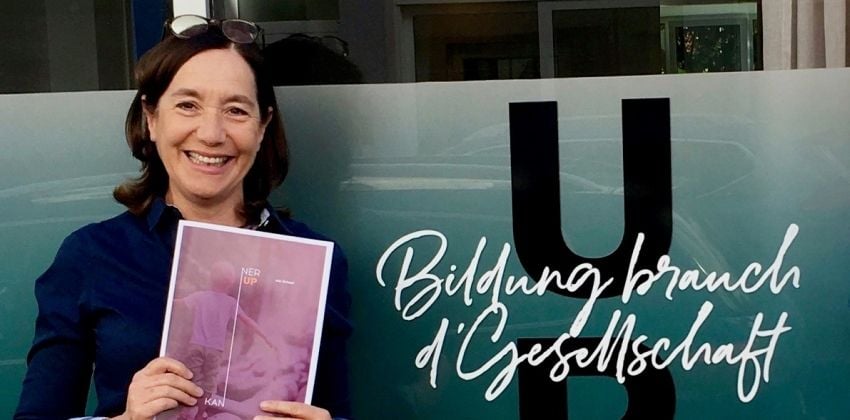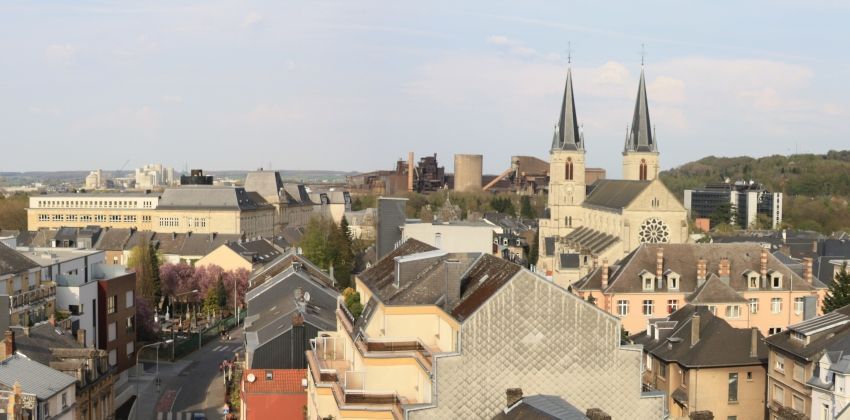Inspired by Swiss examples of Educational Landscapes, the UP Foundation is building the first educational landscape in Luxemburg’s southern city, Esch-sur-Alzette. The Jacobs Foundation spoke with Director Liz Kremer-Rauchs about the foundation established in 2018 and the KANNER_UP project.
The UP Foundation is still very new. Could you tell us more about your work?
Our motto, in Luxembourgish, is “Bildung brauch d’Gesellschaft” (“education needs the support of society”). Our mission is to provide a platform that allows people to engage in open discussions of educational issues – a place for them to get to know one another, and to exchange ideas and put them into practice.
Our work is divided into four distinct areas: NET, LAB, FORUM and AWARD. In NET, we bring together those who are active in the field of education, both within and outside the school context; in LAB, we promote innovative ideas related to educational issues, and in FORUM we organize conferences for the broader public. Through AWARD, we recognize outstanding initiatives that are developed in society at large.
Our first major project is KANNER_UP which aims at creating an educational landscape, and it already covers three of our key areas: NET, LAB and FORUM. Since educational landscapes are still a novelty in Luxembourg, it is not surprising that we have encountered numerous challenges since October 2018. We are all the more pleased that we are off to a good start.
What factors influenced the decision to create Luxembourg’s first educational landscape in the southern part of the country?
Esch-sur-Alzette, called the “Minette metropolis”, experienced hard times during the last century because of the steel crisis. However, over the last decade it is once again becoming a vibrant center of creative activity. It is home to the University of Luxembourg, and there is a palpable sense of optimism and renewal in the city. We want to take advantage of this momentum to achieve more equal opportunities. By the end of the year, KANNER_UP will have created a network of more than 40 extracurricular partners, with 250 workshops for some 2.800 children. We are planning five new projects in LAB, and the first FORUM will take place in the spring of 2020.

Motto of the UP Foundation is “education needs the support of society”, in Luxembourgish “Bildung brauch d’Gesellschaft”.
The fourth conference of Switzerland’s educational landscapes was held in May. What did you find most inspiring at that event?
We were particularly impressed to discover that each of the 22 successful educational landscapes in Switzerland functions on its own terms. At the event’s “marketplace,” each of the educational landscapes had set up a stand; there we talked with many of the people involved -– street workers, teachers, administrative staff, policymakers – all of whom were eager to share their unique experiences. We were impressed to learn that there is no set formula for a successful educational landscape. The spirit and courage to effect change are clearly the most important factors.
When it comes to educational landscapes, what do Switzerland and Luxembourg have in common?
Multilingualism is obviously a topic that affects both countries, and it poses challenges as we seek new solutions that will provide more equal opportunities. In this context, we believe that it is essential to embrace a broader concept of education, one that encompasses formal (school-based), non-formal (extracurricular) and informal (parental and family-based) education. Perhaps smaller countries have an easier time introducing new ideas. In any event, we are working very closely with the city of Esch, and from what we heard at the conference, close cooperation has been, and continues to be, the key to the success of many of Switzerland’s educational landscapes.
What is already working well in Luxembourg?
Within a period of only a few months, we have created a network of extracurricular actors, which we call UP_NET. Networking is one of our core competencies. We have organized several roundtables in Esch – the first was held at the marketplace in front of the town hall – simply to find out: Who would come? Who is interested in getting involved? That effort led to the creation of our network, which currently has 40 members. Our third trimester began in early October, and we will be expanding our activities to include older students in 2020. Inquiries about becoming a partner in UP_NET are continuing to pour in, which is very gratifying.
